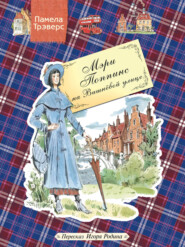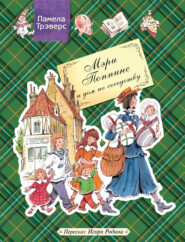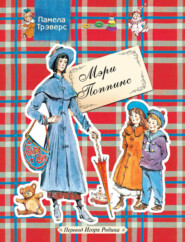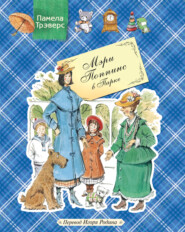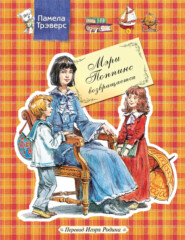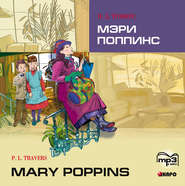По всем вопросам обращайтесь на: info@litportal.ru
(©) 2003-2025.
✖
Mary Poppins - the Complete Collection
Настройки чтения
Размер шрифта
Высота строк
Поля
Jane, after some hesitation, eventually decided that a white dickey would be just the thing for Mr Banks, and she bought Robinson Crusoe for the Twins to read when they grew up.
“Until they are old enough, I can read it myself,” she said. “I am sure they will lend it to me.”
Mary Poppins then had a great argument with Father Christmas over a cake of soap.
“Why not Lifebuoy?” said Father Christmas, trying to be helpful and looking anxiously at Mary Poppins, for she was being rather snappy.
“I prefer Vinolia,” she said haughtily, and she bought a cake of that.
“My goodness,” she said, smoothing the fur on her right-hand glove. “I wouldn’t half like a cup of tea!”
“Would you quarter like it, though?” asked Michael.
“There is no call for you to be funny,” said Mary Poppins, in such a voice that Michael felt that, indeed, there wasn’t.
“And it is time to go home.”
There! She had said the very words they had been hoping she wouldn’t say. That was so like Mary Poppins.
“Just five minutes longer,” pleaded Jane.
“Ah do, Mary Poppins! You look so nice in your new gloves,” said Michael wilily.
But Mary Poppins, though she appreciated the remark, was not taken in by it.
“No,” she said, and closed her mouth with a snap and stalked towards the doorway.
“Oh, dear!” said Michael to himself, as he followed her, staggering under the weight of his parcels. “If only she would say ‘Yes’ for once!”
But Mary Poppins hurried on and they had to go with her. Behind them Father Christmas was waving his hand, and the Fairy Queen on the Christmas tree and all the other dolls were smiling sadly and saying, “Take me home, somebody!” and the aeroplanes were all beating their wings and saying in bird-like voices, “Let me fly! Ah, do let me fly!”
Jane and Michael hurried away, closing their ears to those enchanting voices, and feeling that the time in the Toy Department had been unreasonably and cruelly short.
And then, just as they came towards the shop entrance, the adventure happened.
They were just about to spin the glass door and go out, when they saw coming towards it from the pavement the running, flickering figure of a child.
“Look!” said Jane and Michael both together.
“My gracious, goodness, glory me!” exclaimed Mary Poppins, and stood still.
And well she might, for the child had practically no clothes on, only a light wispy strip of blue stuff that looked as though she had torn it from the sky to wrap round her naked body.
It was evident that she did not know much about spinning doors, for she went round and round inside it, pushing it so that it should spin faster and laughing as it caught her and sent her whirling round and round. Then suddenly, with a quick little movement she freed herself, sprang away from it and landed inside the shop.
She paused on tiptoe, turning her head this way and that, as though she were looking for someone. Then, with a start of pleasure, she caught sight of Jane and Michael and Mary Poppins as they stood, half-hidden behind an enormous fir tree, and ran towards them joyously.
“Ah, there you are! Thank you for waiting. I’m afraid I’m a little late,” said the child, stretching out her bright arms to Jane and Michael. “Now,” she cocked her head on one side, “aren’t you glad to see me? Say yes, say yes!”
“Yes,” said Jane smiling, for nobody, she felt, could help being glad to see anyone so bright and happy. “But who are you?” she enquired curiously.
“What is your name?” said Michael, gazing at her.
“Who am I? What is my name? Don’t say you don’t know me? Oh, surely, surely—” The child seemed very surprised and a little disappointed. She turned suddenly to Mary Poppins and pointed her finger.
“She knows me. Don’t you? I’m sure you know me!”
There was a curious look on Mary Poppins’ face. Jane and Michael could see blue fires in her eyes as though they reflected the blue of the child’s dress and her brightness.
“Does it – does it,” she whispered, “begin with an M?”
The child hopped on one leg delightedly.
“Of course it does – and you know it. M-A-I-A. I’m Maia.” She turned to Jane and Michael.
“Now you recognize me, don’t you? I’m the second of the Pleiades. Electra – she’s the eldest – couldn’t come because she’s minding Merope. Merope’s the baby, and the other five of us come in between – all girls. Our Mother was very disappointed at first not to have a boy, but now she doesn’t mind.”
The child danced a few steps and burst out again in her excited little voice:
“Oh, Jane! Oh, Michael – I’ve often watched you from the sky, and now I’m actually talking to you. There is nothing about you I don’t know. Michael doesn’t like having his hair brushed, and Jane has a thrush’s egg in a jam jar on the mantelpiece. And your Father is going bald on the top. I like him. It was he who first introduced us – don’t you remember? He said one evening last summer:
“‘Look, there are the Pleiades. Seven stars all together, the smallest in the sky. But there is one of them you can’t see.’
“He meant Merope, of course. She’s still too young to stay up all night. She’s such a baby that she has to go to bed very early. Some of them up there call us the Little Sisters, and sometimes we are called the Seven Doves, but Orion calls us ‘You girls’ and takes us hunting with him.”
“But what are you doing here?” demanded Michael, still very surprised.
Maia laughed. “Ask Mary Poppins. I am sure she knows.”
“Tell us, Mary Poppins,” said Jane.
“Well,” said Mary Poppins snappily, “I suppose you two aren’t the only ones in the world that want to go shopping at Christmas—”
“That’s it,” squealed Maia delightedly. “She’s quite right. I’ve come down to buy toys for them all. We can’t get away very often, you know, because we’re so busy making and storing up the Spring Rains. That’s the special job of the Pleiades. However, we drew lots and I won. Wasn’t it lucky?”
She hugged herself happily.
“Now, come on. I can’t stay very long. And you must come back and help me choose.”
And dancing about them, running now to one and now to another, she shepherded them back to the Toy Department. As they went, the crowds of shoppers stood and stared at them and dropped their parcels with astonishment.
“So cold for her. What can her parents be thinking of!” said the Mothers, with voices that were suddenly soft and gentle.
“I mean to say—!” said the Fathers. “It shouldn’t be allowed. Must write to The Times about it.” And their voices were unnaturally gruff and gritty.
The shopwalkers behaved curiously, too. As the little group passed they bowed to Maia as though she were a Queen.
But none of them – not Jane, nor Michael, nor Mary Poppins, nor Maia – noticed nor heard anything extraordinary. They were too busy with their own extraordinary adventure.






